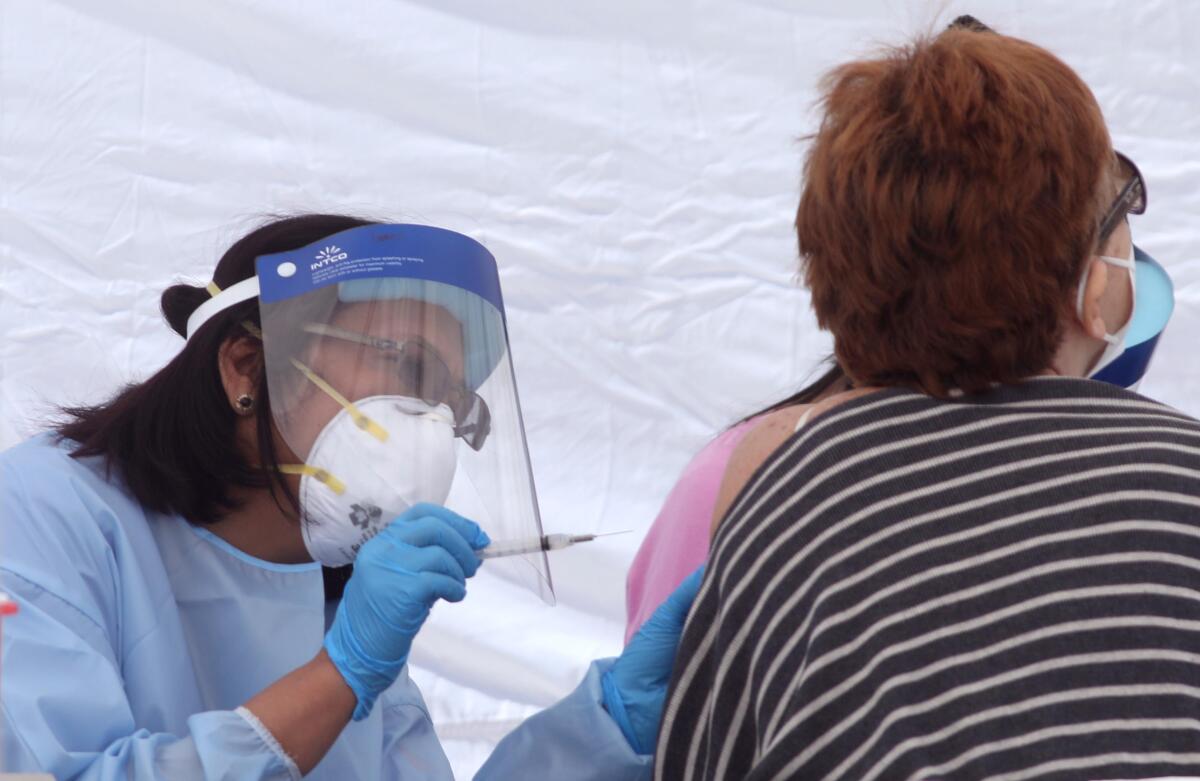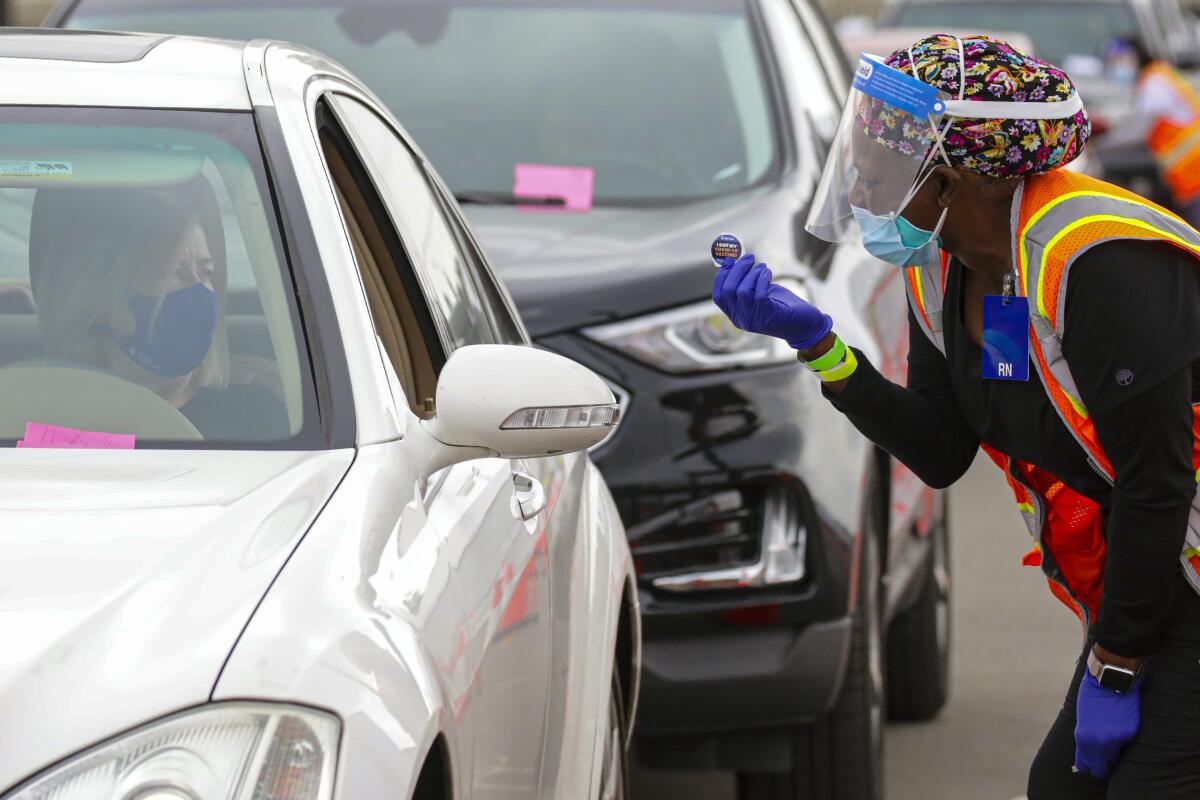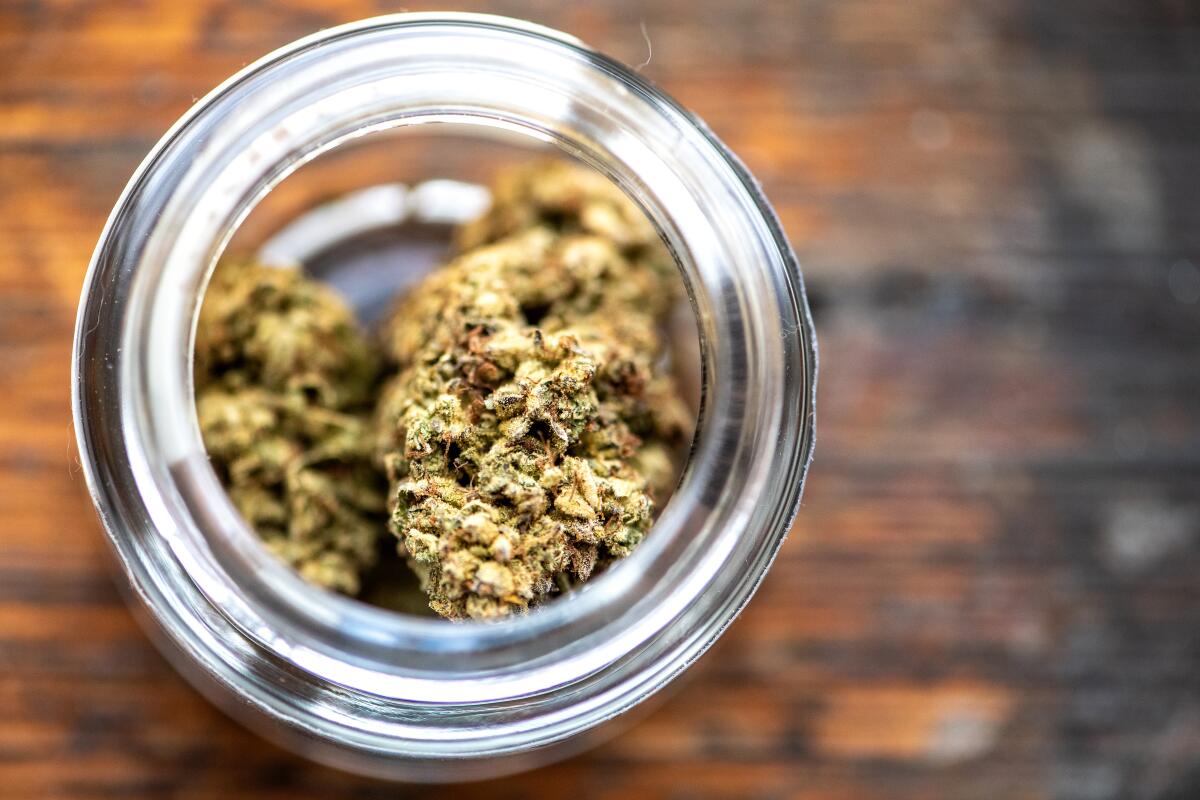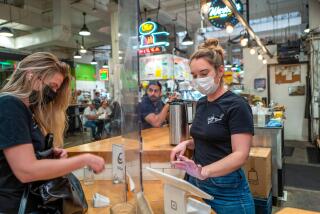Should cannabis workers get COVID vaccine before teachers? They are in California

- Share via
Last weekend, Jonatan Cvetko drove to a fire station in South L.A. and got vaccinated.
He’s not a senior citizen who is at particularly high risk of dying from COVID-19. Nor does he work at a hospital, spending his days and nights tending to critically ill patients on ventilators.
He does, however, own a cannabis shop. And as of last week, that alone makes Cvetko eligible to get his first dose right now — ahead of most teachers and cops in Los Angeles County, not to mention bus drivers and grocery store clerks. All he had to do was make an appointment online and bring along his work badge and paystub to show those on staff at the fire station just in case.
If that sounds crazy, I hear you.
I, too, had trouble understanding why the California Department of Public Health would vault tens of thousands of cannabis workers to the front of the eligibility line when the state’s most vulnerable residents can’t even get vaccinated because of supply shortages.
Just this week, Gov. Gavin Newsom acknowledged that there aren’t enough doses to ensure every teacher is protected before schools reopen. And on Wednesday, Mayor Eric Garcetti announced that L.A. would temporarily close five drive-through vaccination centers, including Dodger Stadium.
But as it turns out, there actually is a logical reason for prioritizing some cannabis workers for COVID-19 vaccines. You just may not like it.

Jerred Kiloh, president of the L.A.-based United Cannabis Business Assn. and owner of the Higher Path dispensary in Sherman Oaks, summed it up this way: Cannabis is medicine, so cannabis workers are healthcare workers.
“After 26 years of calling it medical marijuana, how can you now disenfranchise what we’ve called medical and then tell us we’re not health workers or that we’re not providing medicine for people?” he said, his voice rising in indignation. “It’s slightly disingenuous to put a label on something and then take it away whenever it’s convenient for you as a government.”
California really backed itself into a corner on this one — particularly Newsom, given that he was the main proponent of legalizing the sale of cannabis for adult use with Proposition 64 and came to office with strong backing from the industry.
Kiloh capitalized on those political and policy decisions of the past to lobby state officials into submission last month, arguing, in part, that the heavily taxed, heavily regulated industry deserved the help from a government that has taken it for granted.
His initial ask, and that of a separate coalition of marijuana businesses, was for everyone in the industry — from retail workers to growers to delivery drivers — to be included in the upcoming Phase 1B, Tier 1 of the state’s vaccine rollout plan. This is the group that includes food and agriculture workers, law enforcement and teachers, among other essential workers.
“Should outbreaks of the virus result in closure of our businesses,” Cvetko, who also is executive director of the United Cannabis Business Assn., wrote to Newsom in January, “then Californians will only have the option of obtaining their medicine from the massive and unregulated illicit market.”
Instead, the California Department of Health inexplicably went even further, allowing those who work at retail cannabis shops to be treated as healthcare workers by being included in Phase 1A, which is underway now. Others in the industry — those in growing, production, storage, transportation and distribution — got bumped up to Phase 1B, Tier 1.
What this means on the ground is another matter.
Los Angeles County has been following the state’s updated guidelines, including by vaccinating cannabis workers who work in retail, the county public health department confirmed. But San Diego County has opted out following an uproar by a member of the Board of Supervisors. It’s possible other counties might, too. Members of L.A. County’s Board of Supervisors couldn’t be reached for comment late Wednesday or were unable to comment.
The state guidelines also stipulate that only people who sell cannabis in medical dispensaries can be treated as prioritized healthcare workers. But the reality is more complicated, since most of California’s 1,200 or so cannabis stores are licensed to sell to customers with doctor’s recommendations as well as those without them, meaning most stores are also medical dispensaries.
Plus, it’s unlikely that the staff at vaccination sites would be able to quickly discern whether someone works at a shop that doesn’t also serve as medical dispensary.
Kiloh says it doesn’t matter because all cannabis is medicine anyway — an assertion that many in the industry echo, including Paul Hanson, who manages the shop Hollywood High Grade.
And if you can follow that train of logic, both Kiloh and Hanson also describe their employees not just as healthcare workers, but as “front-line” healthcare workers who are valiantly risking their lives each day to serve “patients” and, therefore, deserve to be vaccinated.
“Have you ever gone to a dispensary? A lot of them are not well-ventilated. There’s a lot of people that go inside there, even though we keep our capacity at a minimum,” Hanson said of the green and white building where he sells cannabis on Santa Monica Boulevard. “People come in here who are sick. On top of that, it’s a cash-only business.”
All of this is no doubt true, and cannabis workers do face genuine risk.
But what about the millions of other mostly Black and Latino essential workers who risk their lives every day in retail settings and die of COVID-19 at disproportionate rates? Is a poorly ventilated liquor store or health food store really all that different from a poorly ventilated cannabis store?

And what of the millions of people of all ages who live in overcrowded housing in some of California’s poorest neighborhoods and are struggling to get vaccinated because there aren’t enough doses? Or those who stay on the streets in homeless encampments?
In Los Angeles County, only about 7% of Black residents who are 65 or older have gotten at least one dose, the lowest percentage of any racial group. Meanwhile, only about 14% of Latino residents in the same age group have been vaccinated. Santa Clara County has reported similar numbers. And, what’s more, most vaccinations are happening in communities far away from where the number of COVID-19 cases are highest.
“We have a lot of work to do to fix this,” L.A. County Public Health Director Barbara Ferrer said Tuesday at a L.A. County Board of Supervisors meeting. “However way you cut this data, it’s clear that in some of our hardest-hit communities, there are populations that are not getting vaccinated at the same rate as other groups.”
Inoculating people who sell cannabis, even if it is medicine and even if they are healthcare workers, isn’t the way to eliminate these pressing racial disparities and achieve vaccine equity. Nor is it a way to open schools safely or ensure that the oldest among us don’t die prematurely.
It all comes down to priorities. And I’m still trying to figure out what ours are in California.
More to Read
Sign up for Essential California
The most important California stories and recommendations in your inbox every morning.
You may occasionally receive promotional content from the Los Angeles Times.














